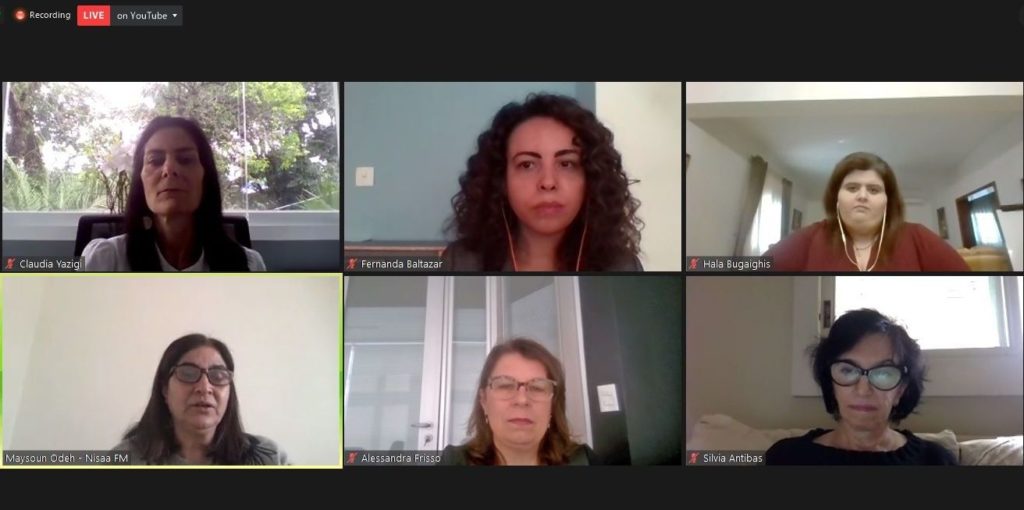São Paulo – The COVID-19 pandemic has highly impacted the lives of women both in Brazil and the Arab countries. So said the participants of the online event “Arab Women Who Inspire” hosted by the Arab Brazilian Chamber of Commerce (ABCC)’s women’s committee WAHI – Women Who Inspire on March 8, International Women’s Day. The webinar got some 400 viewers from Brazil and elsewhere.
“The pandemic has highly impacted women, and I believe we’ll keep seeing this in the next years,” said Libya’s Hala Bugaighis, who created a research center on women and an incubator for women-led businesses in Libya. She believes the pandemic has caused a regression in the role of women in her country. “Women has taken on again the burden of taking care of the house, raising kids, as well as working outside the home,” the feminist said.
Palestine’s Maysoun Odeh Gangat, who created a women’s radio station in Ramallah, was the other Arab guest speaker in the webinar. She has also noticed a larger impact of the pandemic in the lives of women in her country compared to men. “Many jobs were lost, and women were the victims,” she said, pointing out the double shift for those who managed to secure their jobs.
WAHI chairwoman Alessandra Frisso said the same has occurred in Brazil, as women have taken up duties at home and at work, and that the pandemic has been more critical for low-income women. “In Brazil we have a part of the population who really struggle to get into the labor market, extremely hardworking women who live in communities, are heads of families, a daily struggle to raise kids, lead a family life, and they are greatly struggling during COVID-19, but they are also teaching us a lot,” she said.
All participants said they believe that, despite the challenging moment the world is experiencing due to COVID-19, the situation is ripe for female leaderships. “The women who are leaders give a great example, as they lead with empathy, they lead with feminine values, they lead with care and attention. I believe women’s movements across the world should strengthen this,” said Bughaighis. According to her, women can solve crisis and change courses with wisdom and care.
Gangat agrees with Bughaighis and believes the moment is perfect to work on female leadership in order to show its strengths and how women can drive change around them. She notices that, in the current moment her country is experiences, struggling with health issues, vaccines and social distancing, the role of women has been essential. Odeh Gangat mentioned the participation of women as doctors and said she believes there will be an increase of their participation in politics and decision making in Palestine.
Online world
Frisso pointed out that, besides the health and humanitarian challenges ushered in by COVID-19, the world has gone through a digital acceleration. Palestine’s Gangat believes digitization is a great challenge for women who should be able to have more say in the information technology (IT) sector. “It’s still a male-dominated field. We must encourage more women and girls to enter into the digital arena,” she said.
Bughaighis pointed out that, in her country, there is a major gender gap in technology. She said women usually have access to smartphones and laptops, but they are as good as men’s and don’t always have access to the internet, which makes it hard to work with technology, particularly in business. “We’re trying to foster projects to help women work with technology, to adapt with these new changes,” the Libyan woman said.
ABCC Institutional Relations manager Fernanda Baltazar also tackled the challenge that the digital world and innovation pose to people. “How can we take this to SME female owners who aren’t in the big cities,” she said. Baltazar moderated the talks between Arab and Brazilian women and the audience.
Gangat said that in the current situation where Palestine experiences an emergency, including lockdown, much concern around the economy and the vaccination, she tries to deliver a positive message to her female audience. “At the micro level, what we can do is delivering a more positive feeling that encourage their projects,” she said.
The two Arab guest speakers brought some good news regarding access to education for girls and women in their countries. They were asked to address the topic by WAHI director Claudia Yazigi Haddad. Gangat and Bughaighis said there’ve more women than men in most universities. “In Palestine, education is key. Boys and girls are highly educated here,” said Gangat. However, women have less access to jobs.
Dreams in Libya and Palestine
Gangat and Bughaighis talked about their dreams for the future of women in their respective countries and how they notice something different in the newer generations of girls. “I’d like to see more tangible results, more actual impacts for Palestinian women concerning assuring our rights, reaching independence and having our voices listened to in the society,” Gangat said. She believes the newer generations are very ambitious and opinionated but are in need financial support, visibility and networking.
Bughaighis dreams that Libyan women will recognize their value and play an even more active role in the economic and social sphere in the country. “I work with many girls and young women, I’m very impressed by them, as they don’t play traditional roles,” she said, mentioning the work goal of Libyan women – videogame developers, doctors, and astronauts – and adding how this makes her hopeful about the future.
WAHI, the women’s group that hosted the event, was founded last June, and this was its first International Women’s Day. Since it was created, the committee has worked to bring Arab and Brazilian women closer together in such events. In addition to Frisso, Haddad and Baltazar, the webinar featured ABCC cultural director and WAHI director Silvia Antibas.
Watch the full webinar on YouTube.
Translated by Guilherme Miranda




